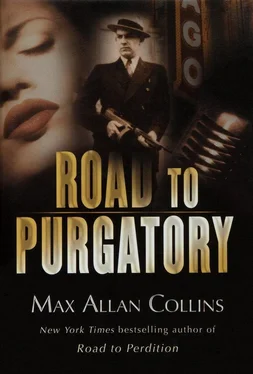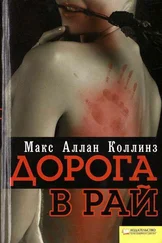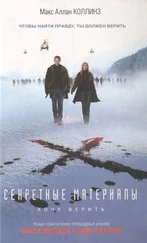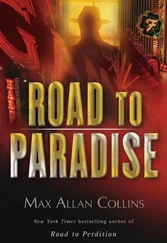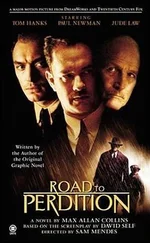“Vitale’s tall, dark, looks sleepy,” Campagna said. “He ain’t. Usually kind of duded up. The other one, Neglia, is short and squat. Froggy-lookin’ guy, a slob. Dangerous.”
“What do they do for Abatte?”
“Rough people up who welsh on gambling debts. I hear Vitale’s the one who does the shooting. Neglia, he beats on people, while Vitale holds a gun on ’em.”
“Thanks. Always good to know the players.”
“Well, Abatte himself’s more dangerous than his boys. Time to time, he makes a point of putting a bullet in a welsher’s head his own self, so that word gets around what a hard case he is.”
“Nice to know.”
Campagna cut into his steak, blood running. “Squirt’s got a big sense of himself. Likes to throw his weight around, like little guys do, sometimes.”
Campagna himself was on the small side, but Michael said nothing, and managed not to smile.
“Will they have guns on them?” Michael asked.
“Mutt and Jeff will. The boss, he’ll have a gun and probably a shiv in his desk. But he likes to wear a tux and act the big shot, and a gun under the arm ruins the cut of a tux, you know. The line.”
“Yeah. Fred Astaire hardly ever packs a rod.”
Campagna thought about that for a second, then laughed. “Hey, that’s funny... Kid — you don’t look nervous.”
“Should I be?”
“You’re puttin’ that steak and fries away, just fine.”
“Is this a test, Louie?”
“No! No, hell no, kid. It’s just, I’d be nervous, if I was thrown into this pit for the first time. Little slice of hell, like Cal City.”
“This isn’t hell, Louie. Purgatory, maybe.”
They began checking specific clubs of Abatte’s; he had offices in the back of all of them.
In the 21 Club, where the decor ran to college pennants, a skinny stripper with an appendicitis scar was bumping and grinding, and all the lipstick in the world couldn’t hide the horsiness of her face. But the young army trainees sitting along the runway were staring up at her pubic thatch in awe, perhaps just figuring out where they came from.
At the bar, drinking Coke from a bottle, his back to the naked woman, was a little boy of perhaps ten in a plaid short-sleeve shirt and jeans, seated way up on a stool, kicking his legs in boredom.
“Stripper’s kid, probably,” Campagna said with a shrug.
In the Club Siesta, a little Mexicale combo played for another stripper; at the Oasis, a bigger band, six pieces, offered up swing and boogie-woogie tunes, filling a postage-stamp dance floor, the men keeping their hats on because nobody stayed at any one of these joints long — whole point was to go up and down the street sampling sin.
The smell of cheap beer common to all these joints Michael found repellent, and all of them were filled with gray-blue clouds of cigar and cigarette smoke — no wonder the steel mill hands felt at home here.
Whatever the theme of the club, the ambience was the same: skimpy decorating failing to deliver on neon promises, crude unprofessional murals of pinup girls often drawn directly on otherwise unpainted walls, cheap wooden tables cluttered with beer bottles and ashtrays, where men sat with women they usually hadn’t come in with.
The floozies were not dolled up — they looked like ordinary factory or shopgirls, if a little harder; and Michael could not be sure if these were hookers or just pick-ups. Party girls or pros, Campagna explained that such shenanigans were fine with Nitti — this kind of thing could not be policed by Ness.
In several joints, however, Michael noted women taking men by the arm — sailors and other servicemen, and steel-mill hands — and disappearing up back stairways. Each time, Campagna gave his young friend a knowing look and nod.
And in every joint, Campagna asked to see Mr. Abatte and, in every joint, Mr. Abatte was not in.
The Ozark had a three-piece hillbilly band including a balladeering guitarist, with a slightly larger sawdust-covered dance floor. This was a rough crowd, and a bouncer had to break up a couple of brawling steel workers at the bar, fighting over a young woman who seemed bored to tears, blowing smoke rings while they hammered at each other.
This cleared (and knocked over almost) every stool at the bar, at least momentarily, and Campagna seized the moment to approach the bartender, a bald bruiser with a cigarette in his tight lips and a white shirt and black tie.
Campagna asked, “Mr. Abatte in?”
“Maybe. Who wants him?”
“Frank Nitti.”
“You’re not Frank Nitti.”
“You’re not Frank Abatte.”
The bartender mulled over that conundrum for a moment. Customers were returning to the scene of the brawl, turning stools right side up, and climbing aboard.
“I’ll let them know you’re here,” the bartender said, and used a phone down the bar.
Several minutes later, as a courtesy, the bartender brought them draw beers. Campagna nodded to the guy, but neither man drank them. Michael didn’t care for the stuff, and he had an idea Campagna feared a Mickey.
Just enough time had gone by to make Michael hope he’d never hear a country fiddle player again when a door to one side of the bar opened. Framed there was a toad-like man in a rumpled light blue gabardine and a dark blue porkpie hat about the same color as his five o’clock shadow.
Michael glanced at Campagna, raising his eyebrows in a silent question that Campagna answered with a curt nod: this was Abatte’s man Neglia, all right.
Campagna headed over but Michael put a hand on the older man’s shoulder.
His whisper barely audible over the country-and-western racket, Michael said gently, “Let me lead the way, Louie.”
Louie paused, and bestowed another curt nod: Nitti had indeed meant for Michael to handle this.
Unbuttoning his suitcoat, Michael stepped out front. At the doorway, Neglia held up a thick hand, traffic-cop fashion. The thug’s round head rested on a mammoth double chin atop a neckless frame; but Neglia was more massive than fat, the shoulders and arms powerful-looking.
“I don’t know you,” the toad-like toady said thickly.
“I don’t know you,” Michael said.
“But I know him,” Neglia said, with a gesture toward Campagna.
“Now that we’ve established who you know and who you don’t know,” Michael said, “let’s see Mr. Abatte.”
“You don’t have an appointment.”
“He’s not a goddamn dentist. Stand aside.”
Neglia scowled. “You don’t talk to me that way.”
“I’m talking for Frank Nitti. Stand aside.”
Campagna, behind Michael, said, “What are you, Neglia? The bridge troll? Get the fuck outa the way.”
Neglia’s sigh came out his nose and mouth simultaneously in a foul wave of garlic. Michael’s eyes damn near teared up. Then the toad turned and led them into a short hallway, Campagna shutting the door behind them. At another door, Neglia knocked shave-and-a-haircut.
“Nitti’s guys!” Neglia called.
“Okay!” a deep voice responded.
Neglia opened the door, went in first, allowed Michael and Campagna to step inside, then closed it behind them. The room was medium-size and probably looked bigger than it was, usually, since the only furnishings were an old scarred-up desk with chair, with a chair opposite, the wall behind decorated with framed stripper photos, hanging crooked; but the office was in fact crowded.
Frank Abatte — a small, weasel-faced man with thinning black Valentino hair and wide-set dark blue eyes — was seated behind the desk; as advertised, he wore a tuxedo. A hooded-eyed hood, skinny in a sharp gray pinstripe and pearl-gray fedora, stood just behind his boss, at right; this was obviously Vitale.
Along the left wall stood three more individuals — a dumpy cigar-chewing guy in an apron, a tall blond fortyish man in a black vest and slacks, and a heavyset woman about fifty in a new polka-dot dress as crisp-looking as she wasn’t.
Читать дальше
